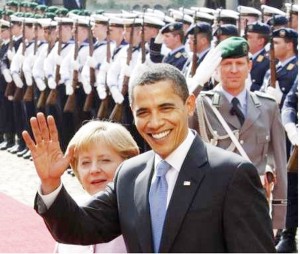STRASBOURG, France, (Reuters) – U.S. President Barack Obama called for a world without nuclear weapons yesterday after arriving in France for a NATO summit, where he won French endorsement of his new Afghanistan strategy.

Obama, greeted like a hero by the crowds, also reached out to Russia, saying it was important for NATO to work with Moscow to try to resolve an array of diplomatic tensions.
NATO is celebrating its 60th anniversary this weekend and although its old Soviet-bloc enemy has long gone, Obama said the threat of nuclear catastrophe remained. “Even with the Cold War over, the spread of nuclear weapons or the theft of nuclear material could lead to the extermination of any city on the planet,” Obama said at a U.S.-style town hall meeting in the French city of Strasbourg yesterday.
“This weekend in Prague, I will lay out an agenda to seek the goal of a world without nuclear weapons,” he said, referring to a EU-U.S. summit in the Czech Republic tomorrow which follows the NATO gathering.
Obama helped broker a deal at a G20 summit in London on Thursday to tackle the global financial crisis and is looking for similar consensus from NATO leaders on how to turn the tide against the worsening Afghan crisis. French President Nicolas Sarkozy immediately threw his weight behind Obama’s new plan, which aims to get a grip on rising violence by al Qaeda and Taliban militants driven from power in 2001 but never completely defeated.
“I have not had to drag France kicking and screaming into Afghanistan because France recognises that having al Qaeda operating safe havens that can be used to launch attacks is a threat not just to the United States but to Europe,” Obama said.
Obama was cheered by well-wishers squashed behind security barriers when he arrived in Strasbourg, receiving a kiss from a woman in the crowd as he headed for talks with Sarkozy.
The warm reception stood in stark contrast to the often cold welcome reserved for his predecessor, former President George W. Bush, who was hugely unpopular on this side of the Atlantic thanks largely to his decision to invade Iraq in 2003.
Obama’s Afghan strategy broadens the focus to include Pakistan and puts the highest priority on the defeat of al Qaeda militants. Looking to engage sceptical Europeans in the war, Obama said they were more threatened by al Qaeda than America.
“…It is probably more likely that al Qaeda would be able to launch a serious terrorist attack on Europe than on the United States because of proximity,” he said.
NATO’s Afghan mission has been criticised by some as chaotic but European leaders have been reluctant to commit more forces to a war that is increasingly unpopular with voters.
Having already announced plans to add 17,000 U.S. combat troops to the 38,000 already there, Obama said he would send 4,000 more to help train Afghan officials to combat problems such as the booming narcotics trade and government corruption.
Obama has said countries that felt unable to commit more military forces to Afghanistan should at least boost help for the civilian effort.
NATO Secretary-General Jaap de Hoop Scheffer has called on other allies to send up to 4,000 more troops to safeguard August elections. He also wants them to make up a shortfall in training teams for the Afghan army and police force.





